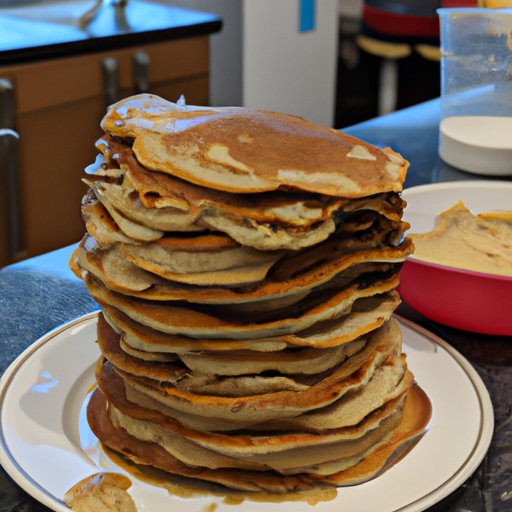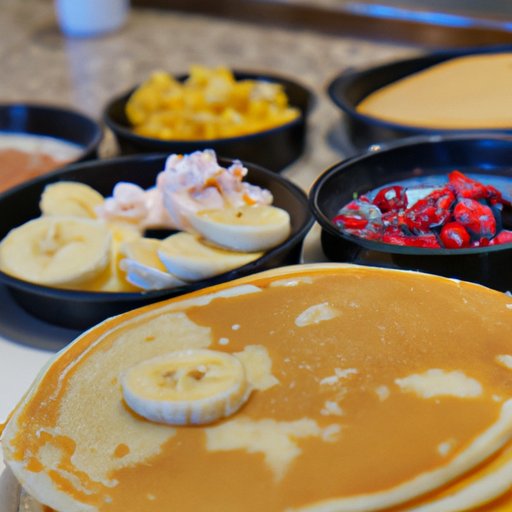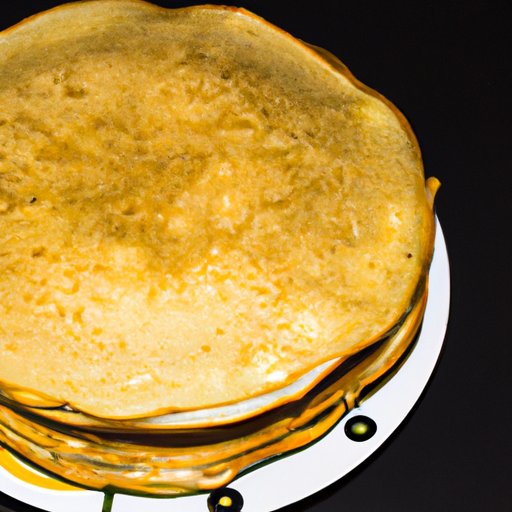Introduction
Are pancakes bad for you? This is a common question that many people have when considering adding pancakes to their diets. Pancakes are a popular breakfast food, but they don’t always have the best reputation when it comes to health. In this article, we’ll explore the nutritional profile of pancakes, as well as the potential health benefits and risks associated with consuming them.

Examining the Nutritional Profile of Pancakes
Pancakes are made from a combination of flour, baking powder, eggs, milk, and butter or oil. This combination provides a range of macronutrients, vitamins, and minerals. According to the USDA, one large (4-inch) pancake contains approximately:
- 113 calories
- 3 grams protein
- 15 grams carbohydrates
- 5 grams fat
- 1 gram dietary fiber
- Vitamins B1, B2, B3, B6, and folate
- Minerals such as calcium, iron, magnesium, phosphorus, potassium, sodium, and zinc
The exact nutrient content will vary depending on the type of flour used, as well as any additional ingredients added to the batter. For instance, whole wheat flour will provide more dietary fiber than white flour.

Exploring the Health Benefits and Risks of Pancake Consumption
Pancakes can be a great breakfast option, but it’s important to consider the potential health benefits and risks associated with consuming them. Let’s take a closer look at what the research says.
Potential Health Benefits
Pancakes can provide a number of essential nutrients, including proteins, carbohydrates, fats, vitamins, and minerals. This makes them a great source of energy and nutrition in the morning. Additionally, some studies have shown that pancakes can help promote satiety, or feelings of fullness, which can help to prevent overeating later in the day.
Potential Health Risks
While pancakes can be a nutritious breakfast option, it’s important to keep in mind that they are high in calories and sugar. Additionally, some toppings, such as sugary syrups and jams, can add even more calories and sugar to your meal. Therefore, it’s important to monitor your intake of pancakes and toppings to ensure you’re not overconsuming calories or sugar.
Investigating the Different Types of Pancakes Available
In addition to traditional pancakes, there are a variety of different types of pancakes available. Each type offers its own unique nutritional profile.
Traditional Pancakes
Traditional pancakes are made with white flour and other ingredients such as eggs, milk, and butter. They are high in carbohydrates and contain moderate amounts of protein and fat. These pancakes also provide vitamins and minerals such as calcium, iron, and vitamin B6.
Oat-Based Pancakes
Oat-based pancakes are made with oat flour instead of white flour. Oat flour is higher in dietary fiber than white flour, making these pancakes a better source of fiber. Additionally, oats are a source of plant-based protein, which makes these pancakes a good source of both protein and fiber.
Gluten-Free Pancakes
Gluten-free pancakes are made with gluten-free flours such as almond flour, coconut flour, or rice flour. These flours are lower in carbohydrates than white flour, but they still provide vitamins and minerals such as calcium, iron, and vitamin B6. Additionally, these flours are often higher in dietary fiber than white flour, making gluten-free pancakes a great source of fiber.

A Look at Popular Toppings for Pancakes
Pancakes are often topped with a variety of ingredients. Some of the most popular toppings include syrups, jams, and fresh fruits. While these toppings can add flavor and nutrition to your meal, it’s important to keep in mind that some of them, such as syrups and jams, are high in sugar and calories.
Comparing Pancakes to Other Breakfast Options
When considering whether or not pancakes are a healthy breakfast option, it’s important to compare them to other breakfast options. Let’s take a look at how pancakes compare to hot cereal, toast, and eggs.
Hot Cereal
Hot cereal is typically made with oats, millet, barley, or quinoa. It’s a good source of carbohydrates, protein, and fiber, as well as vitamins and minerals such as iron, magnesium, and zinc. Hot cereal is also lower in calories than pancakes, making it a better choice for those looking to manage their calorie intake.
Toast
Toast is typically made with whole grain bread, which is a good source of carbohydrates, protein, and dietary fiber. Additionally, whole grain bread provides vitamins and minerals such as folate, iron, and magnesium. Toast is also lower in calories than pancakes, making it a better choice for those looking to manage their calorie intake.
Eggs
Eggs are a great source of protein and healthy fats. They are also a good source of vitamins and minerals such as vitamin A, vitamin D, and selenium. Eggs are typically lower in calories than pancakes, making them a better choice for those looking to manage their calorie intake.
Conclusion
In conclusion, pancakes can be a great breakfast option if consumed in moderation. They provide essential nutrients such as proteins, carbohydrates, fats, vitamins, and minerals. Additionally, some studies have shown that pancakes can help promote satiety, or feelings of fullness, which can help to prevent overeating later in the day. However, it’s important to keep in mind that pancakes are high in calories and sugar, so it’s important to monitor your intake of pancakes and toppings to ensure you’re not overconsuming calories or sugar. When comparing pancakes to other breakfast options, it’s important to consider the nutritional profile and calorie content of each option to determine which one is the best choice for you.
(Note: Is this article not meeting your expectations? Do you have knowledge or insights to share? Unlock new opportunities and expand your reach by joining our authors team. Click Registration to join us and share your expertise with our readers.)
